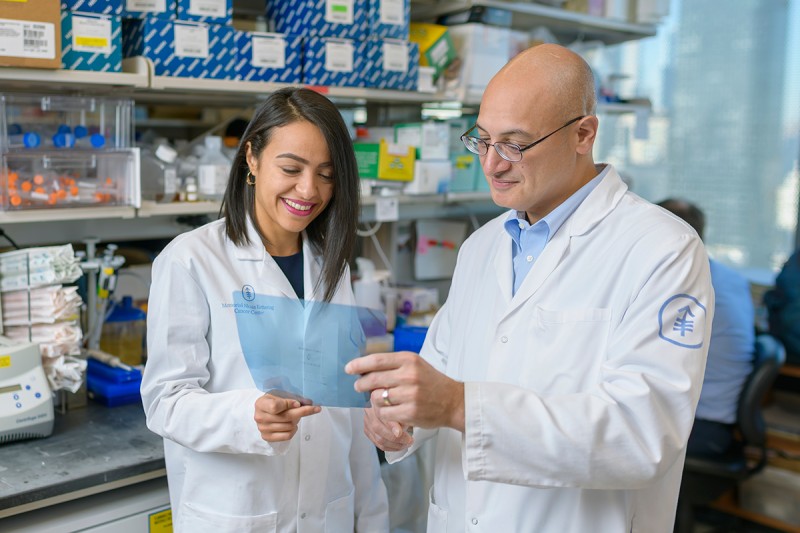
MSK's Dr. Omar Abdel-Wahab was honored at the ASH 2023 Annual Meeting. He is pictured here along with postdoctoral fellow Dr. Salima Benbarche, who presented the lab's latest blood cancer research at the conference.
Physician-scientist Omar Abdel-Wahab, MD, is being honored at the 2023 American Society of Hematology (ASH) Annual Meeting with the William Dameshek Prize, which recognizes individuals who have made outstanding contributions to the field of hematology. The award will be presented December 12.
Dr. Abdel-Wahab, who chairs the Molecular Pharmacology Program at Memorial Sloan Kettering Cancer Center (MSK), was selected for his “trailblazing research” characterizing the genetic mutations that drive blood cancers. His lab at MSK has focused on understanding mutations in the RNA splicing mechanism that lead to the development of myelodysplastic syndromes (MDS) and leukemia.
New research from his lab, led by postdoctoral fellow Salima Benbarche, PhD, was also presented at a scientific plenary session at the conference. It highlighted an investigation of problems with RNA splicing that suggests a potential new therapeutic approach against MDS and other blood cancers.
Dr. Abdel-Wahab’s discoveries have paved the way for the development of drugs targeting RNA splicing activity, which are currently in the early phases of clinical development, ASH noted in a news release. Additionally, his research has played a pivotal role in securing the U.S. Food and Drug Administration’s approval of the first targeted therapies for patients with rare blood cancers known as systemic histiocytic neoplasms.
“I’d like to thank ASH for this recognition,” Dr. Abdel-Wahab says. “This is an area where we don’t yet have good treatments. But we’re close, and getting closer all the time.”
We recently sat down with Dr. Abdel-Wahab to discuss the new findings and his blood cancer research program at MSK’s Sloan Kettering Institute.
At a high level, what does your lab study?
I’m a hematologist — a blood cancer doctor — and I’m interested in the genetics of blood cancers. We want to understand the mutations that occur in our blood and bone marrow that drive development of blood cancers, and then ask if they can be used to develop therapies to treat them.
Since starting my lab in 2012, we’ve published a series of papers that established that the most common class of genetic mutations in patients with MDS are mutations in the genes involved in RNA splicing machinery.
Splicing is an essential process that converts DNA into a protein for use by the body, and here it goes awry in a way that drives blood cancer development. Splicing is a middle step between when RNA is transcribed from DNA and when mature messenger RNA (mRNA) can direct the making of a protein. This step “splices out” portions of the immature mRNA that aren’t involved in making the protein.
When the genes controlling this process are mutated, they actually change the function of splicing machinery in a cancer-driving way. They don’t cause a loss of function; they create a new function and generate new types of proteins that lead to the development of cancer.
And these mutations are surprisingly common. They’re found in the blood-making cells of about 70% of patients with MDS and in about 20% of patients with acute myeloid leukemia, as well as in other blood cancers.
It’s also really unexpected that you would have mutations in this very fundamental housekeeping process itself.
And what were the findings of the research that Dr. Benbarche presented at ASH?
It was primarily a molecular biology study, but it does have potential implications for developing new treatments.
The first thing we did is identify a sequence in the RNA that is uniquely recognized by the mutated splicing factor. And then we used that as a screening method to figure out what additional genes or proteins are required for that mutant splicing factor to function — to create those oncogenic proteins.
This effort resulted in the discovery of a previously unstudied protein known as GPATCH8. Without this protein, the mutated RNA splicing machinery doesn’t work.
So, if we can find a way to disrupt GPATCH8 in patients with these mutations, it could have significant therapeutic benefit.
And from a scientific standpoint, the study also demonstrates the power of the approach we took — a technology called synthetic introns — to help discover key biological players involved with these RNA splicing factors that get mutated in blood cancers and other types of cancer.
What does this award mean to you and your lab?
While I’m very honored to receive this award, it’s important to point out that none of this work was done by me alone. It takes a village, as they say.
This has been an area of research that I myself and the people who have trained in my lab have helped develop. There have been 10 people in my lab over the plast decade who have worked on this topic and gone on to independent academic careers where they continue to work on the interplay between RNA and cancer.
And that, too, gives me great hope for the future and shows the impact that places like MSK can have on the broader field of cancer research.
Dr. Abdel-Wahab’s research receives essential philanthropic support from the MSK Giving community, including Break Through Cancer, Cycle for Survival, the Edward P. Evans Foundation, The Hairy Cell Leukemia Foundation and The Leukemia & Lymphoma Society, the Neil S. Hirsch Foundation, and the Peter and Susan Solomon Family Foundation.